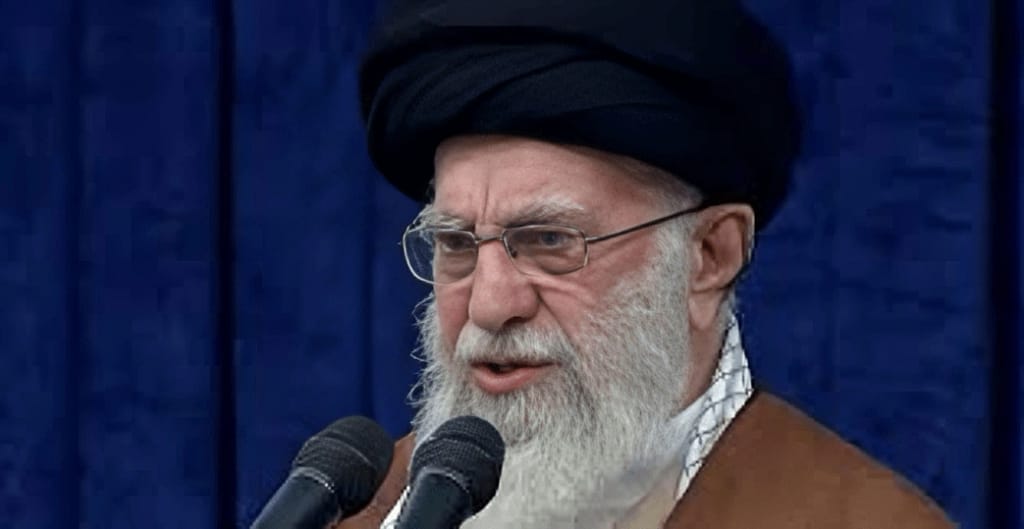In a recent address, Iranian Supreme Leader Ayatollah Ali Khamenei made a bold statement regarding the ongoing conflict in Syria, calling the events in the war-torn country the result of a “joint American and Zionist plan.” This accusation reflects Iran’s longstanding political and ideological stance toward the U.S. and Israel, which are often portrayed by Iranian leaders as the primary instigators of instability in the Middle East. Khamenei’s remarks highlight the complex geopolitical dynamics of Syria’s civil war, the regional rivalry, and the strategic interests of various international actors, including Iran, the U.S., Israel, and others in the region.
Background of the Syrian Conflict
The Syrian conflict, which began in 2011 as part of the wider Arab Spring protests, has evolved into one of the most destructive and complex wars in modern history. Initially, peaceful demonstrations against President Bashar al-Assad’s authoritarian regime quickly escalated into a violent confrontation as the government forces cracked down on protestors. Over time, the conflict attracted a multitude of local, regional, and international actors, each pursuing their own interests.
On one side, Assad’s regime, which is supported by Iran, Russia, and various Shiite militia groups, has been engaged in a bitter struggle to retain power. On the other side, rebel groups, some of which were backed by Western nations, Saudi Arabia, and Turkey, sought to overthrow the Assad government. Over the years, ISIS and other extremist groups also became involved, further complicating the conflict. The situation was made even more intricate by the involvement of U.S.-led coalitions and Israeli strikes against Iranian and Hezbollah positions within Syria.
In this context, Khamenei’s accusations point to a perception of the conflict as a proxy war involving not just regional powers but global superpowers as well. His statement suggests that the Syrian crisis is not just an internal struggle but rather a carefully orchestrated series of actions by the U.S. and Israel to reshape the Middle East to their advantage, particularly at the expense of Iranian influence.
The Iranian Perspective on U.S. and Israeli Involvement
For Khamenei and the Iranian leadership, the U.S. and Israel represent a formidable axis of opposition to Iran’s ambitions in the region. Iran, under Khamenei’s leadership, has consistently viewed these two nations as adversaries, particularly as they work to curtail Tehran’s influence over the Middle East, a region of critical importance due to its resources and strategic position.
Iran’s involvement in Syria has been both ideological and strategic. Since the beginning of the Syrian civil war, Tehran has provided significant military and financial support to Bashar al-Assad’s regime. This support includes the deployment of Iranian Revolutionary Guard Corps (IRGC) forces, as well as the mobilization of allied Shiite militias from Iraq, Lebanon (Hezbollah), and Afghanistan. Iran’s goal has been to preserve its ally Assad and maintain its regional influence, particularly through the so-called “Shiite Crescent” that extends from Tehran through Baghdad, Damascus, and Beirut.
The U.S., for its part, has also been deeply involved in Syria, albeit with a different set of priorities. Initially, the U.S. supported various opposition groups in an attempt to weaken Assad’s regime, although this changed over time, especially as the rise of ISIS became a more immediate concern. The U.S. has been involved in efforts to defeat ISIS and has also targeted Iranian military installations and allies in Syria. Washington’s goal has been to curb Iranian influence and to prevent the establishment of a permanent Iranian military presence in Syria, which could serve as a strategic platform against Israel and the broader region.
Khamenei’s characterization of these actions as a “joint American and Zionist plan” reflects his belief that both the U.S. and Israel have sought to undermine Iran’s influence in Syria and, by extension, the broader Middle East. For Khamenei, the ongoing war in Syria represents not just a battle for Assad’s survival but a contest for regional hegemony, where Iran’s presence in Syria is a symbol of its regional power and its ability to influence the outcomes of conflicts across the Middle East.
The Role of Israel in the Syrian Conflict
Israel, for its part, has been actively involved in the Syrian conflict, though not in the same way as the U.S. Israel’s primary concern in Syria has been Iran’s growing military presence, particularly the establishment of Iranian bases near its border. The Israeli government views the expansion of Iranian influence in Syria, especially the deployment of Hezbollah forces and other Iranian-backed militias, as a direct threat to its national security. Israel has repeatedly carried out airstrikes against Iranian and Hezbollah targets in Syria to prevent the establishment of a permanent Iranian foothold.
The Israeli government, led by Prime Minister Benjamin Netanyahu, has been consistent in its efforts to push back against Iran’s presence in Syria, warning that it would not tolerate any Iranian military infrastructure close to its borders. This concern stems from the broader regional rivalry between Iran and Israel, with both countries vying for influence over key regional allies and access to critical resources. Israel’s stance is also shaped by its longstanding policy of maintaining military superiority in the region and preventing any adversarial forces from gaining a foothold near its borders.
Khamenei’s remarks about the “Zionist plan” are grounded in a long-standing narrative in Iranian political discourse, where Israel is often portrayed as a destabilizing force in the Middle East. In this view, Israel, backed by the U.S., seeks to weaken any potential power in the region that could challenge its hegemony, including Iran. Khamenei’s claim that the events in Syria are a result of this “joint plan” suggests that he sees the conflict as part of a broader Israeli and American strategy to reduce Iran’s influence in the region and to reshape the Middle East according to their geopolitical preferences.
The Geopolitical Implications of Khamenei’s Statement
Khamenei’s statement about the “joint American and Zionist plan” serves to reinforce Iran’s longstanding narrative of resistance against foreign intervention and the struggle for regional influence. For Iranian officials, Syria is not just another country in conflict—it is a battleground for broader geopolitical struggles involving global powers. Khamenei’s rhetoric, which includes anti-Western and anti-Israeli sentiment, is part of a wider ideological framework that portrays Iran as a defender of sovereignty against foreign powers.
At the same time, Khamenei’s remarks also highlight the deepening division between Iran and the West, particularly in the wake of the U.S. withdrawal from the Iran nuclear deal (JCPOA) and the ongoing tensions over Iran’s nuclear program. As Iran continues to face international pressure, especially from the U.S. and Israel, the Syrian conflict serves as a critical front in this larger ideological and geopolitical struggle.
The conflict in Syria has thus become a microcosm of the broader power struggle in the Middle East, with multiple countries vying for influence and control. Khamenei’s statement reflects Iran’s perception of this struggle and its determination to maintain its position as a regional power. His comments also suggest that Iran will continue to support the Assad regime and fight back against foreign interference, particularly from the U.S. and Israel.
Conclusion
Ayatollah Khamenei’s remarks about Syria being the product of a joint American and Zionist plan are part of Iran’s broader ideological stance, which views the U.S. and Israel as key adversaries in the Middle East. His statement reflects the complex and multi-layered nature of the Syrian conflict, where various international actors, including Iran, the U.S., Israel, and Russia, are deeply invested in the outcome. Khamenei’s words are not only a reflection of Iran’s geopolitical concerns but also a reminder of the ongoing struggle for regional influence that continues to shape the Middle East’s future. For Iran, Syria remains a critical battleground in this broader conflict, and Khamenei’s comments signal that Tehran will continue to resist any efforts by external powers to weaken its position in the region.





